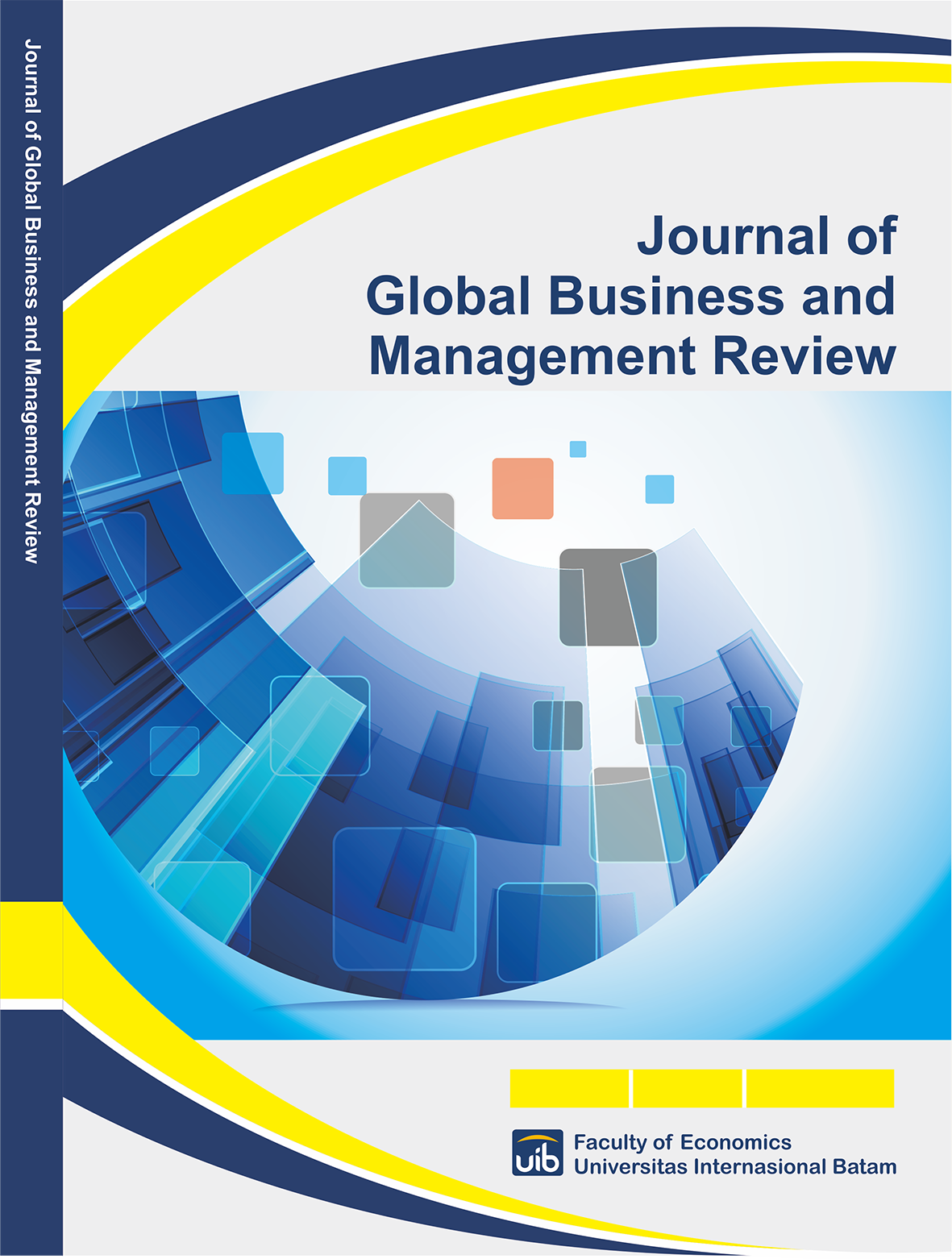Examining The Effect of Educational Level and Job Suitability on Employment Sector in Cirebon City
DOI:
https://doi.org/10.37253/jgbmr.v6i1.9295Keywords:
Eduucational Level, Job Suitability, Employment SectorAbstract
This research analyzed survey data from 204 Cirebon City residents to investigate the associations between education level, job suitability, and employment sector. Education was classified as primary, secondary, high school, or university education. Job suitability compares respondents’ education to the typical qualifications needed for their current role. Outcomes included the sector of employment in fields such as services, manufacturing, finance, technology, and others. The results showed that higher education levels and greater alignment between schooling and occupation were associated with more employment in high-skilled sectors, such as finance and technology. Those with a university education and high education-job match tended to work in professional sectors. The findings indicate strong links between academic credentials, the occupational relevance of education, and securing jobs in skilled sectors. This study provides insights that can help shape policies that promote schooling and employment congruence.Downloads
References
Behar, A., & Mok, J. (2019). Does public‐sector employment fully crowd out private‐sector employment? Review of Development Economics, 23(4). https://doi.org/10.1111/rode.12613
Bick, A., Fuchs-Schündeln, N., Lagakos, D., & Tsujiyama, H. (2022). Structural change in labor supply and cross-country differences in hours worked. Journal of Monetary Economics, 130, 68–85. https://doi.org/10.1016/j.jmoneco.2022.05.007
Borowczyk-Martins, D., Bradley, J., & Tarasonis, L. (2018). Racial discrimination in the U.S. labor market: Employment and wage differentials by skill. Labour Economics, 50, 45–66. https://doi.org/10.1016/j.labeco.2018.02.010
Brunckhorst, B., Cojocaru, A., Kim, Y. S., & Kugler, M. (2024). Long COVID: The evolution of household welfare in developing countries during the pandemic. World Development, 175, 106485. https://doi.org/10.1016/j.worlddev.2023.106485
Chen, Y. (2022). A directed search model of crowding out. Review of Economic Dynamics, 43, 308–340. https://doi.org/10.1016/j.red.2021.02.009
Cheung, S. Y., & Woo, L. (2021). Age stereotypes and the job suitability of older workers from hotel managers’ perspectives. International Journal of Hospitality Management, 95, 102932. https://doi.org/10.1016/j.ijhm.2021.102932
Dhanaraj, S., & Mahambare, V. (2019). Family structure, education and women’s employment in rural India. World Development, 115, 17–29. https://doi.org/10.1016/j.worlddev.2018.11.004
Eriksson, K., Russ, K. N., Shambaugh, J. C., & Xu, M. (2021). Reprint: Trade shocks and the shifting landscape of U.S. manufacturing. Journal of International Money and Finance, 114, 102407. https://doi.org/10.1016/j.jimonfin.2021.102407
Esteban-Pretel, J., & Fujimoto, J. (2020). Non-regular employment over the life-cycle: Worker flow analysis for Japan. Journal of the Japanese and International Economies, 57, 101088. https://doi.org/10.1016/j.jjie.2020.101088
Fuady, A., & Dewi, K. H. (2019). How Did Women Workers Get Benefit From Revolution 4.0? Proceedings of the International Conference of Democratisation in Southeast Asia (ICDeSA 2019). https://doi.org/10.2991/icdesa-19.2019.24
Fusaro, S., & Scandurra, R. (2023). The impact of the European social fund on youth education and employment. Socio-Economic Planning Sciences, 88, 101650. https://doi.org/10.1016/j.seps.2023.101650
Gordon, G., Jones, J. B., Neelakantan, U., & Athreya, K. (2023). Incarceration, employment, and earnings: Dynamics and differences. Review of Economic Dynamics, 51, 677–697. https://doi.org/10.1016/j.red.2023.06.007
Jameson, A., Carthy, A., McGuinness, C., & McSweeney, F. (2016). Emotional Intelligence and Graduates – Employers’ Perspectives. Procedia - Social and Behavioral Sciences, 228, 515–522. https://doi.org/10.1016/j.sbspro.2016.07.079
Jeske, D., Shultz, K. S., & Owen, S. L. (2018). Perceived interviewee anxiety and performance in telephone interviews. Evidence-Based HRM: A Global Forum for Empirical Scholarship, 6(3). https://doi.org/10.1108/ebhrm-05-2018-0033
Kong, X., Zhang, X., Yan, C., & Ho, K.-C. (2022). China’s historical imperial examination system and corporate social responsibility. Pacific-Basin Finance Journal, 72, 101734. https://doi.org/10.1016/j.pacfin.2022.101734
Laulita, N. B., & Setyawan, A. (2021). How Organizational Culture Moderate the Effect of Total Productive Maintenance Practice on Organization’s Operational Performance? Evidences from Indonesian Mining Industry. Jurnal Optimasi Sistem Industri, 20(2), 93-103.
Lawson, C., & Lopes-Bento, C. (2024). Miss or match? The impact of PhD training on job market satisfaction. Research Policy, 53(3), 104945. https://doi.org/10.1016/j.respol.2023.104945
Lin, H.-T., Chen, Y.-T., Chou, T.-Y., & Liao, Y.-C. (2012). Crew rostering with multiple goals: An empirical study. Computers & Industrial Engineering, 63(2), 483–493. https://doi.org/10.1016/j.cie.2012.04.013
Lin, L., & Shen, J. (2018). Spatial patterns and driving forces of uneven dual-track urbanisation in Fujian Province: An approach based on employment sectors. Urban Studies, 56(12). https://doi.org/10.1177/0042098018798596
Malinowski, M., & Jabłońska-Porzuczek, L. (2020). Female activity and education levels in selected European Union countries. Research in Economics, 74(2), 153–173. https://doi.org/10.1016/j.rie.2020.04.002
McElroy, J. C., Summers, J. K., & Moore, K. (2014). The effect of facial piercing on perceptions of job applicants. Organizational Behavior and Human Decision Processes, 125(1), 26–38. https://doi.org/10.1016/j.obhdp.2014.05.003
Mindes, S. C. H., & Lewin, P. (2021). Self-employment through the COVID-19 pandemic: An analysis of linked monthly CPS data. Journal of Business Venturing Insights, 16, e00280. https://doi.org/10.1016/j.jbvi.2021.e00280
Narita, R. (2020). Self-employment in developing countries: A search-equilibrium approach. Review of Economic Dynamics, 35, 1–34. https://doi.org/10.1016/j.red.2019.04.001
Nguyen, T., Ha, V. D., & Dang, T. T. N. (2020). The Impact of Human Resource Management Activities on the Compatibility and Work Results. The Journal of Asian Finance, Economics and Business, 7(9). https://doi.org/10.13106/jafeb.2020.vol7.no9.621
Ni, J., Chen, M., Chen, Q., Zhao, R., Liao, X., Li, C., Xu, Y., & Xu, L. (2023). Analysis of hospital infection knowledge, beliefs, behavior, and influencing factors among healthcare workers in Chinese medicine hospitals in Hunan Province. Informatics in Medicine Unlocked, 43, 101274. https://doi.org/10.1016/j.imu.2023.101274
Noguchi, T., Wakabayashi, R., Nishiyama, T., Otani, T., Nakagawa-Senda, H., Watanabe, M., Hosono, A., Shibata, K., Kamishima, H., Nogimura, A., Nagaya, K., Yamada, T., & Suzuki, S. (2021). The Impact of Job Conditions on Health-Related Quality of Life among Working Japanese Older Adults: A Five-Year Longitudinal Study Using J-MICC Okazaki Study Data. Archives of Gerontology and Geriatrics, 95, 104385. https://doi.org/10.1016/j.archger.2021.104385
Pinto, L. H., & Ramalheira, D. C. (2017). Perceived employability of business graduates: The effect of academic performance and extracurricular activities. Journal of Vocational Behavior, 99, 165–178. https://doi.org/10.1016/j.jvb.2017.01.005
Priambodo, A. (2021). The Impact of Unemployment and Poverty on Economic Growth and the Human Development Index (Hdi). Perwira International Journal of Economics & Business, 1(1), 29–36. https://doi.org/10.54199/pijeb.v1i1.43
Priambodo, A. (2023). Analisis Pengaruh Daya Saing Daerah dan Tingkat Pengangguran Terhadap Pertumbuhan Ekonomi Kabupaten dan Kota di Jawa Tengah. Al Kalam Jurnal Komunikasi, Bisnis, Dan Manajemen, 10(2), 67–87.
Priambodo, A. (2024). Peran Kriminalitas Sebagai Pemoderasi Antara Kemiskinan dan Pengangguran Terhadap Laju Pertumbuhan Ekonomi. Al-KALAM : JURNAL KOMUNIKASI, BISNIS DAN MANAJEMEN, 11(1), 132. https://doi.org/10.31602/al-kalam.v11i1.11985
Riekhoff, A.-J., & Vaalavuo, M. (2021). Health shocks and couples’ labor market participation: A turning point or stuck in the trajectory? Social Science & Medicine, 276, 113843. https://doi.org/10.1016/j.socscimed.2021.113843
Sarwari, M. A. (2022). Investigating the Relationship Between the Field of Study and the Employment Status of Graduates of the Faculty of Education of Parwan University. International Journal for Research in Applied Sciences and Biotechnology, 9(2). https://doi.org/10.31033/ijrasb.9.2.29
Setyawan, A. (2021). The Role of Organizational Culture in the Influence of HR Practices, Knowledge Management, and Talent Management on Organizational Performance. JDM (Jurnal Dinamika Manajemen), 12(2), 275-284.
Shahen, M. E., Kotani, K., Kakinaka, M., & Managi, S. (2020). Wage and labor mobility between public, formal private and informal private sectors in a developing country. Economic Analysis and Policy, 68, 101–113. https://doi.org/10.1016/j.eap.2020.09.006
Shaked, H. (2019). Ensuring Teachers’ Job Suitability: A Missing Component of Instructional Leadership. Journal of School Leadership, 29(5). https://doi.org/10.1177/1052684619858837
Song, W., Yang, W., Wang, N., Wang, C., Li, Z., Ou, Y., & Zhang, X. (2024). How does industrial transformative process shape the spatial dynamics of urban development? Land Use Policy, 138, 107015. https://doi.org/10.1016/j.landusepol.2023.107015
Stollberger, J., Shemla, M., Cremer, D. D., Yu, Y., & Sanders, K. (2022). Does emotional restraint or exuberance get you the job? How and when enthusiasm intensity is related to perceived job suitability. Human Resource Management, 62(2). https://doi.org/10.1002/hrm.22134
Syaeful Bakhri, Aji Priambodo, Fitri Hidayah Sundawati, & Anez Yuniar Pradini. (2023). An analysis of the welfare of informal sector workers in the city of cirebon in the new normal period after the Covid 19 pandemic. World Journal of Advanced Research and Reviews, 19(2), 254–260. https://doi.org/10.30574/wjarr.2023.19.2.1529
Tang, J. (2022). Does lowering housing provident fund contribution rate promote employment? China Economic Quarterly International, 2(3), 190–201. https://doi.org/10.1016/j.ceqi.2022.08.001
Tsitskari, E., Goudas, M., Tsalouchou, E., & Michalopoulou, M. (2017). Employers’ expectations of the employability skills needed in the sport and recreation environment. Journal of Hospitality, Leisure, Sport & Tourism Education, 20, 1–9. https://doi.org/10.1016/j.jhlste.2016.11.002
Wijayaningtyas, M., Lukiyanto, K., Nursanti, E., & Laksmana, D. I. (2022). The effect of economical phenomenon on informal construction workers earnings within Covid-19 pandemic: A mixed method analysis. Heliyon, 8(8), e10321. https://doi.org/10.1016/j.heliyon.2022.e10321
Zhao, Y., Goodell, J. W., Dong, Q., Wang, Y., & Abedin, M. Z. (2022). Overcoming spatial stratification of fintech inclusion: Inferences from across Chinese provinces to guide policy makers. International Review of Financial Analysis, 84, 102411. https://doi.org/10.1016/j.irfa.2022.102411
Downloads
Published
Issue
Section
License
Copyright (c) 2024 Journal of Global Business and Management Review

This work is licensed under a Creative Commons Attribution-NonCommercial-ShareAlike 4.0 International License.















